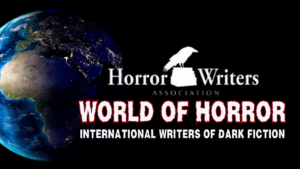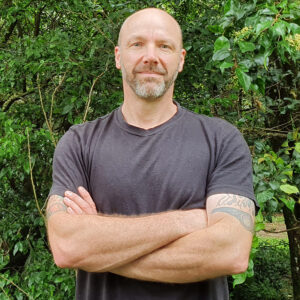World of Horror: Interview with Alan Baxter


Alan Baxter is a multi-award-winning author of horror, supernatural thrillers, and dark fantasy liberally mixed with crime, mystery, and noir. He’s also a martial artist, a whisky-soaked swear monkey, and dog lover. He creates dark, weird stories among dairy paddocks on the beautiful south coast of NSW, Australia.
Find Alan online at: https://www.alanbaxteronline.com/.
What was it about the horror genre that drew you to it?
Honesty. I’ve said many times that horror is the genre of honesty. It doesn’t shy away from harsh truths, it follows the rabbit hole all the way down. No manufactured happy endings, you find truth in the darkness.
Is there a horror tradition in your country, in your culture? A taste for horror, a market? Not necessarily literature; perhaps oral tradition too.
Very much so. Australia has the oldest civilisation on Earth, and indigenous Australians have a long tradition of oral storytelling, some of which is genuinely terrifying. And, more recently, the white Australian culture has evolved some uniquely Australian horrors, often as much around landscape as culture. When you think of things like “Picnic at Hanging Rock,” “Lake Mungo,” “Wolf Creek” and so on, you see a culturally and geographically unique brand of horror.
Who are some of your favorite characters in horror, internationally and/or in your own culture?
This is a difficult one to answer because horror is so massive, but perhaps among my favourite character types are the ones who face the mind-numbing scale of cosmic terror with genuinely human strength. We may be small and insignificant, but we have hope and love, and I enjoy seeing that pitted against horror in the characters I read (and write) about.
Do you make a conscious effort to include characters and settings from your country in your writing, and if so, what do you want to portray?
Most definitely. For one, people are hungry for reading experiences outside the American-centric nature of most media, and for two, it’s really important to me to represent Australia on a world stage. Most of my stuff is unashamedly Australian, in setting and character (like “The Gulp” or “The Roo”), but even things that are more international have Australian influences. “The Alex Caine Series” travels all over the world and to other worlds, but the main character is Australian. Even “Devouring Dark,” which is a London crime/horror novel, has a major character who’s Australian. I want to portray Australia and Australians as what they are—equally diverse and complex and interesting as any other nation or culture.
If you are not a native English speaker, but write in English, do you first think of horror in your native language or English? How do you draft them in your mind, in English or your mother tongue?
I was born in England and have been Australian for almost half my life now, so I’m very much an English speaker. So in terms of language, this question doesn’t apply to me. But I am an immigrant, and I recognise that I see everything through an immigrant lens.
What has writing horror taught you about the world and yourself?
I learn from my writing all the time. At the least, there’s the simple research that goes into making a story cohesive and authentic, which is one of the things I enjoy most about writing fiction, ironically. But it also teaches me to confront the darkness and always look for the light.
How have you seen the horror genre change over the years? And how do you think it will continue to evolve, both in the U.S. and in your country?
It’s most definitely changed. We’re seeing a real renaissance in horror at the moment, and I hope it lasts. We’re finally starting to move away from the “all horror is slasher movies” mentality of the general public, and I hope that continues. We’re seeing recognition of more writers from outside the U.S. and U.K., which is a great thing. And we’re seeing a massive increase in diversity of horror creators, across not only nationalities but also sexualities and genders and so on. Of course, there’s still so far to go on all those fronts, but we’re moving in the right direction.
How do you feel the international horror writing community has been represented thus far in the market, and what hopes do you have for representation going forward?
It’s definitely being featured more prominently, but I think we still need to see a lot more horror from writers outside the continental U.S. to consider it good representation. We need publishers to recognise that too, and come looking for us. We’re here, with great stories to tell!
Who are some international horror authors you would recommend?
Well, as I’m an Australian horror author, I’ll stick to giving a shout-out to a few other Aussies and New Zealanders. You’ll be doing yourself a favour if you check out any of the following:
- Kaaron Warren
- Joanne Anderton
- Aaron Dries
- J. Ashley-Smith
- Angela Slatter
- Lisa L Hannett
- Robert Hood
- Kirstyn McDermott
- Marty Young
- J S Breukelaar
- Matt Tighe
- Geneve Flynn
- Greg Chapman
- Jason Franks
- Zachary Ashford
- Lee Murray
- Dan Rabarts
(I’m sure I’ve missed loads, but that’s a good start. There’s a slew of great writers around here.)
What is one piece of advice you would give horror authors today?
Tell your story. Mine the deepest fears and terrors that are closest to your heart, and don’t be afraid to tell a story from your perspective, from your culture and country, from your soul. We need that diversity, and readers are hungry for those authentic voices.
And to the writers from your country out there who are just getting started, what advice would you give them?
The same advice as above, for one thing. But also, and this is infuriating, try to get out of the country and physically mix with the reading and writing community overseas. It’s an incredibly privileged consideration, but it’s really hard to be noticed outside your own country, and the U.S. is still the heart of horror readership. It’s frustrating, but it’s a fact. I haven’t been able to afford to leave the country for five years, but I’m hoping to get to some events in the U.S. again next year. It really helps to physically present yourself to the community over there at things like StokerCon, Scares That Care, and so on. But in the meantime, write your best stories and be open and authentic wherever you do present yourself (physically and online) and hope for the best. Lift up other writers around you, because a rising tide lifts all boats. Be a supportive part of the writing and publishing community. We’re all in this together.



